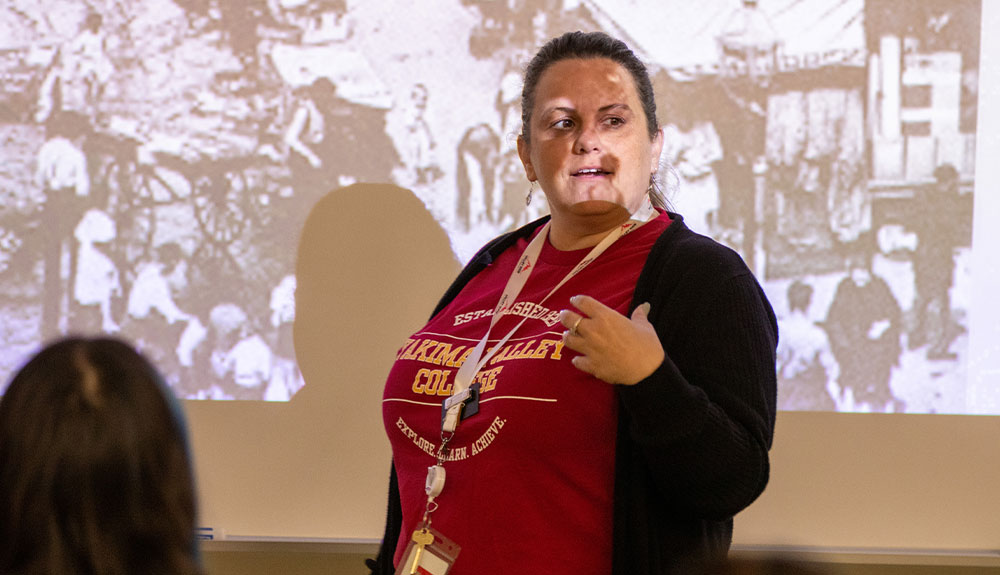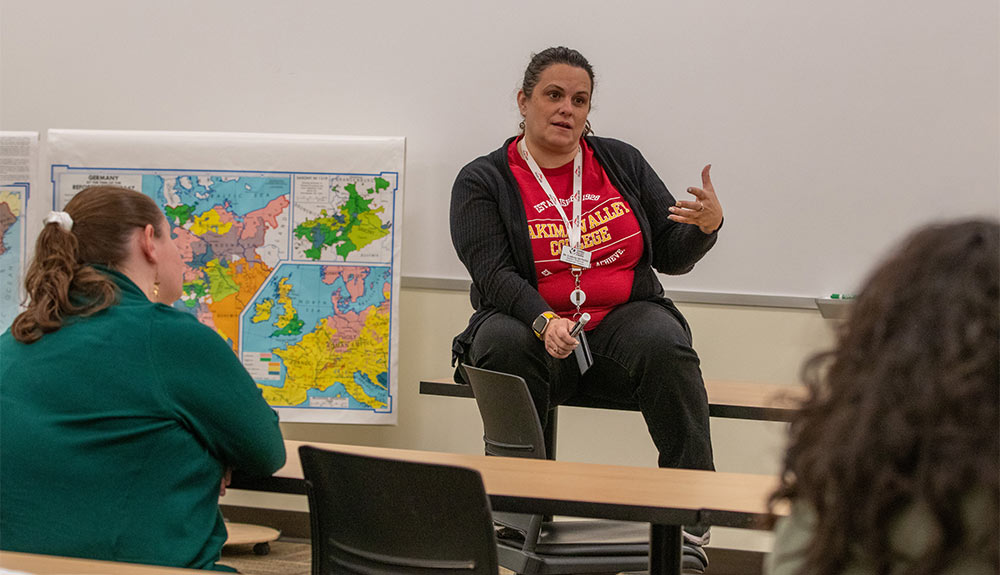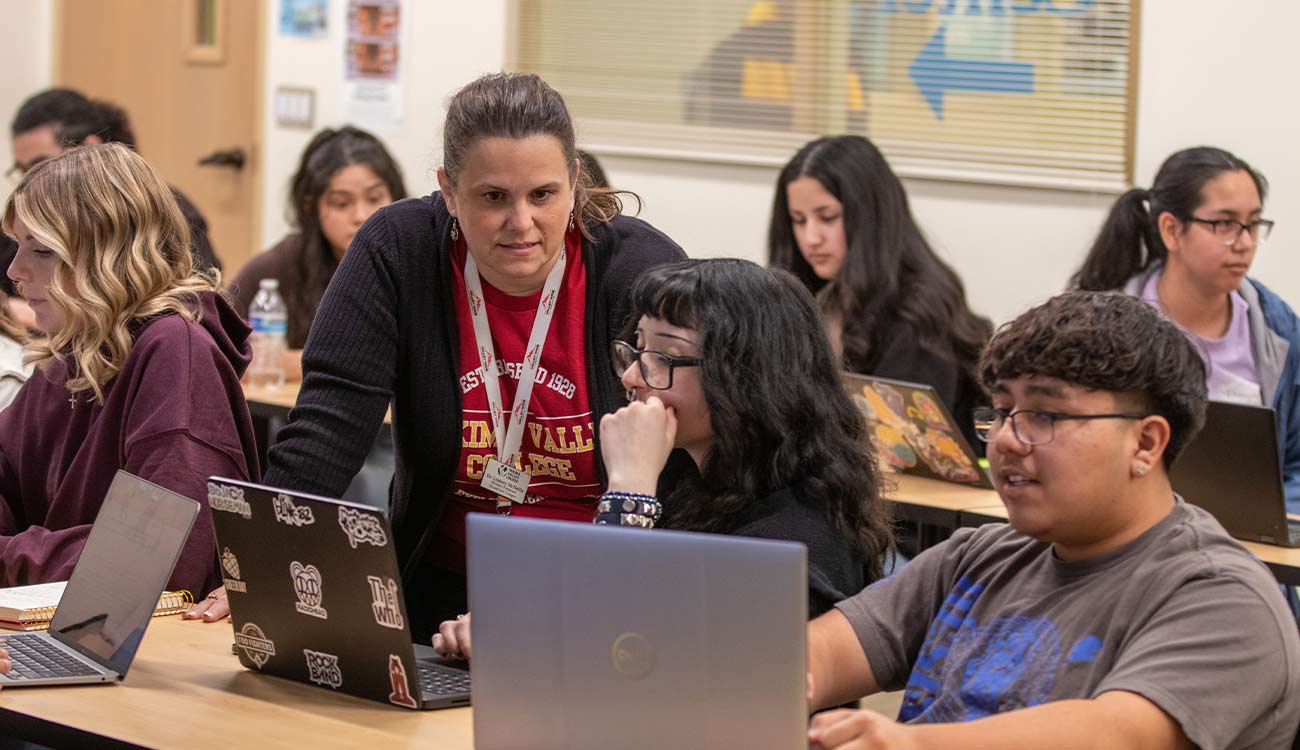For many students, getting excited about learning history can be difficult when the events and people who experienced them seem so distant from the present day. But a new history course at Yakima Valley College is working to change that by connecting past and present — and making the subject more relevant in students’ lives.
YVC History Instructor Lindsey McNellis taught “Women in U.S. History” for the first time during Winter Quarter 2024.
“I think courses that focus on women [and] courses that focus on minority groups are important for every student to take because we grow up hearing the stories of the big-name people. Like, everyone’s heard of Thomas Jefferson. These are the big guys in history,” McNellis said.
Her course aims to change that narrative by shining a light on the significant role women had on the outcome of major events in U.S. history and, at the same time, how women were impacted by those events.
“We start all the way back when Indigenous women were the only women on the continent and we go all the way to 1980s and 1990s,” McNellis said.
Women’s history is central to McNellis’ scholarship, and in her dissertation explored violence and injury suffered by women in medieval England and their interactions with the justice system and other systems of power.
While in her other history courses McNellis says she intentionally pulls in the experiences of women, people of color and other minoritized groups, “Women in U.S. History” allows her to broaden that focus.
“It’s different from a regular history class where you get to the Civil War or World
War I and there’s a focus on learning about the big battles,” McNellis said. “In this
class, that’ll be in the background but we want to talk about what women were doing,
how they were being impacted. I hope that’s a positive experience for students who
feel it’s a more interesting and relevant way to engage with the past.”

Taylor Hershberger, one of the students in the inaugural class, first heard about the class from his advisor as he was planning his schedule for the quarter.
“The course stuck out to me because I like history and I had previously taken [English Instructor] Dodie Forrest’s women’s literature class and I loved that class — it opened me up to a lot of things I hadn’t read before,” Hershberger said. “This class seemed to have a similar kind of ring to it.”
For Hershberger, bringing a different lens to studying history was helpful in gaining a more well-rounded view of events as they unfolded.
“I think the class gave a more dynamic view of history,” he said. “As you go through history, it’s helpful to understand here’s what Indigenous women are experiencing, there’s a civil rights movement happening here at the same time as this women’s movement. That helps you get a broader, more full-color picture of history.”
Among the events discussed in class that Hershberger found particularly compelling
were the stories of Ona Judge, a slave who fled from President George Washington’s household; Liliʻuokalani, the last sovereign monarch of the Hawaiian Kingdom and its only queen;
and Shirley Chisholm, the first black woman elected to the U.S. Congress.
“I hope students see that our dominant narrative, while important, isn’t the only way to look at history or the world around us.”
— Lindsey McNellis
One of McNellis’ hopes for the course is that it will help students feel more empowered about their own ability to make a difference in the present day.
“I hope that, in looking at the past, maybe if we feel silenced right now we won’t always be silenced. So, what we’re producing, what we’re making, what we’re advocating for, at some point it will see the light of day — so don’t stop,” McNellis said. “I think it can be a hopeful message when you can identify that your history is out there, we just have to find it.”
At several points throughout the course, McNellis brought in perspectives close to home. For example, when the class reached the 20th century and women’s experiences during the world wars, students looked at the women’s suffrage movement and what that was like in Washington state.
“We look at what were women doing in the war efforts. Were they advocating for women’s suffrage during this time? We pull in historical documents about women’s marches that took place here,” McNellis said. “Same thing for World War II, also, talking about internment camps. So, what was the Japanese American experience? How does that tie into this region? And then another major push is the later Indigenous rights movements as well as the Chicano rights movements because that had a big part in the history of the Yakima Valley.”
One of the class projects that Hershberger enjoyed was coming up with an idea for a museum exhibit and gathering artifacts to include that would help viewers learn about the subject. His exhibit idea was themed around Native American religious artifacts.
“That was a fun project to learn a good bit about Native American religious artifacts
and build on early in the quarter when we were going through Native American religions,”
he said.

For another class project, Hershberger compared the portrayal of women in two films released in different decades: the 1967 romantic comedy-drama “Two for the Road” starring Audrey Hepburn and the 2019 drama “Marriage Story” featuring Scarlett Johansson.
“It was interesting picking apart the two films and looking at the women in the films and what things in the culture and the day are influencing the portrayals of those characters,” he said.
Going forward, McNellis expects the class to be offered annually, in either winter or spring quarter. And while the majority of students in the inaugural offering of the course were women, McNellis said all students benefit from seeing history in a different light.
“I hope students see that our dominant narrative, while important, isn’t the only way to look at history or the world around us,” she said. “Understanding how women have moved through this world historically will help you better understand how women are moving through life right now. You’ll understand those complexities in our world so much better when you push yourself to look at it from a point of view that isn’t your own.”
Hershberger agreed with that sentiment. After completing his associate degree at YVC, he plans to transfer and pursue further studies in creative writing, English or a similar field. He believes a better understanding of history will benefit whatever professional path he takes.
“I think this class was a really good foundation for me to build off of with writing
or anything else,” Hershberger said. “It’s important to have a fuller picture of the
world, to be able to connect the dots between different events.”
Story and photos by Dustin Wunderlich, director of community relations.
